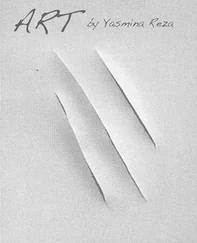“OK, yes—Monsieur Vivaret! . . . What are you doing there, Emmanuel?! ” Pcch pcch! Pcch!!
And he’d splash into the waves with huge leaps.
“Madame Pellouze!” I’d say.
“Emmanuel, will you put down that Kalachnikov!! . . .”
Splash splash pchhhh bang bang!
“Madame Farrugia!”
We’d kill them all off one by one.
These days you’re a “Content Champion” for an ad agency. When people ask what you do, you say Project Chief/Editorial Consultant (the English title is so much nicer!). The photograph gives me back your body from before. I had stopped thinking about it. I never open the albums I used to put together. Those thin arms—I’d like to feel them circling my neck again. Me too, I don’t care about the global stuff either, she’s right, that Anicé.
* * *
One day, with no warning, Rémi put his arm around Jean-Lino Manoscrivi’s neck.
It happened one Sunday at the Hippopotamus. The three of them were having lunch with a couple of friends from Lydie’s jazz club. Rémi, who was bored the way all kids are at the table, had asked permission to go blow bubbles on the open veranda. Jean-Lino was keeping an eye on him when suddenly there was no more Rémi. Jean-Lino goes to see.
No Rémi. He runs down the steps, looks up and down the Avenue General Leclerc:
Nothing. He goes back inside, looks upstairs. No one. Grandma Lydie is frantic. Jean-Lino and she go back outside. They rush to the right, to the left, spin about, run back into the Hippopotamus, question the waiters, run out again. They shout the child’s name, the cityscape is empty, wide open to the winds. The jazz friends have stayed at the table, petrified, no longer touching their plates. A nearby couple discreetly tilt their chins toward a sideboard with a kind of potted palm alongside. Lydie’s girlfriend finally understands the signals, she gets up and finds Rémi crouching behind the flower tub, giggling over his prank. The desperate Manoscrivis return. Lydie flings herself on the child and hugs him to her. She all but congratulates him on his reappearance. Order returns. Jean-Lino hasn’t said a word. He has sat down, pale and somber. Rémi too is back in his seat. They offer him an î le flottante for dessert. He rocks on his chair like a smug kid and then, nobody knows why, he stands up, goes and puts his arms around Jean-Lino, and lays his head on the man’s shoulders. Jean-Lino’s heart swells beyond reason. He believed in the secret triumph of love, like all rejected lovers whose fever flares up anew at the slightest unexpected gesture. Those same gestures mean nothing coming from a person who’s already been won over. I could write plenty on the topic. The guy who never gave you a glance and then one day just randomly, out of inadvertence or perversity, shoots you an unexpected signal—I know what that can set off.
* * *
I should find out how Jean-Lino’s aunt is doing. The visit from Ginette Anicé made me think of her. Jean-Lino had brought his father’s sister to France and got her placed in a Jewish retirement home. I had visited there with him one afternoon. We went to the cafeteria, a large lobby converted to an entirely functional space—floor in patterned tiles, glossy walls, people in wheelchairs seated at tables with visitors. You would have thought that all the materials in the place had been chosen for their high capacity for echo and resonance. The aunt charged ahead with her walker. Quick wit, lively legs. The body, and especially the head, shaken by constant uncontrolled movements that seemed not to bother her but that made her speech muffled and halting. And at the same time, she spoke three languages: a disciplined, old-fashioned French, now half-forgotten; Italian; and Ladin, a dialect of the Dolomite mountains. Jean-Lino settled us at a rear table, in front of a television set tuned at top volume to a channel running short films. During the conversation (if you can call it that), Jean Lino plucked hairs from her face with his fingers. Does she know what’s happened to her nephew? Who does she ever talk to, with her bobbing head, in the wilderness of that hall? The slightest thing can make me doubt the coherence of the world. Its laws seem all independent of one another and they clash. In my little closet of an office at the Pasteur, a fly is exasperating me. I can’t stand it when a fly is stupid. I open the window wide and, instead of heading out into the trees around our building, it comes zigzagging back into the room and toward the far wall. Two seconds ago it was beating against the windowpane, flapping every whichway to get out, and now that the air is flowing in and the sky is spreading its welcoming arms, the damn thing is back indoors wandering crazily about in the shadows. It would serve the bug right if I shut it in and washed my hands of it. But it has that odious buzz going for it. In fact I wonder if that buzz wasn’t created just to protect flies, keep people from imprisoning them. If it weren’t for that performance I’d be merciless. I grab my big patent-law book and chase the fly toward the window, I mean I try to, but instead of surrendering to the merciful weapon it swerves, keeps just out of reach, and goes up to cling to the ceiling molding. Why do I have to put up with such a waste of time? The aunt used to live in the mountains. She still talked about her chickens, the chickens would come into the house and perch everywhere. She wanted to go back to her village to see the yearly cattle-drive up into the hills, she wanted to hear the clang of the cowbells. I’m going to phone the rest home.
* * *
When the lawyer asked me what Jean-Lino was to me, I said a friend. The man acted as if he didn’t understand the word. He wanted to know what I meant by it. One evening, early in our friendship—the term is absolutely precise—I was coming home from the office a little late. Jean-Lino was outside with his Chesterfield cigarettes, his neck naked to the wind. And every time, that smile when he would catch sight of me, the yellowed teeth and their overbite, dazzling in its way. He was cinched into a juvenile-looking fake-leather motorcycle jacket I’d never seen on him. I said, “That’s new? Where’s the Harley?”
“Zara. On sale.”
“Bravo.”
“You like it? It’s not a little tight?”
I put an arm around him, laughing, and I said, “I adore you for buying that!” He laughed too. He said the sales-girl had complimented him. He was dying of heat in the fitting room, he couldn’t stay in there longer than ten seconds. I told him there had rarely been a piece of clothing so ill-suited to its owner.
“Oh really? Shit!”
The two of us laughed hard there under the streetlamp, him coughing his lungs out. He wiped his eyes behind the thick-framed glasses. His pitted face shone a little, I’d never asked him where that scarring came from. I went inside first. He wanted to stay out a bit longer, get some air—translation: have a last smoke. Turning back at the lobby door, through the glass I saw him walking a little in the parking area, his body stooped in his new biker jacket, one hand pressing his hair down along the sides, that look of delight entirely gone now, the way he probably was just before I turned up. I told myself, That’s where we’re at now—you’re growing older too, just like everyone you know, and I felt how I belonged to that throng moving along, hand in hand, growing old, moving along toward something unknown.
* * *
What matters, looking at a photo, is the photographer behind it. Not so much the person who pressed the shutter as the one who’s chosen the picture, who said, “This one I keep, this one I’ll show.” To a hurried eye there was nothing special about the picture of the Jehovah’s Witness. Not the subject, not the lighting. A tired guy in a business suit and tie peddling a magazine. The classic nobody figure you place in the background on a sidewalk in a film on the 1950s. Among the hundreds of photos Robert Frank must have taken in the course of his trip across America, and among those he ultimately selected, there’s this one. At its center is a white patch, the offered magazine, the wrist turned out to show the title, awake, a word completely at odds with the funereal look of its bearer. But it would be wrong to think that the photograph was chosen for its ironical aspect. I hadn’t recalled the title, myself; what I remembered was the unease of the mouth, or of the eyes, I remembered something that’s not there: the sense of a day of weak sunlight. He could be selling strawberries or daffodils with the same obstinacy, frail inside his suit, swallowed up by that wall erected for a conquering human force. You wonder where he goes at night. You know that at some point there must have been some bad bifurcation.
Читать дальше

![Ясмина Сапфир - Охотница и чудовище [СИ]](/books/35157/yasmina-sapfir-ohotnica-i-chudoviche-si-thumb.webp)
![Ясмина Реза - Бог резни [=Бог войны]](/books/63616/yasmina-reza-bog-rezni-bog-vojny-thumb.webp)
![Ясмина Реза - Бог войны [=Бог резни]](/books/63617/yasmina-reza-bog-vojny-bog-rezni-thumb.webp)








